CNA256: Exploring Recovery Principles in Mental Health Care Settings
VerifiedAdded on 2022/08/28
|8
|2110
|14
Essay
AI Summary
This essay examines the significance of recovery principles in mental health care, tracing the historical evolution of mental health treatment from religious superstitions to modern recovery-oriented approaches. It highlights the challenges faced by individuals with mental illness, including stigma and unmet needs, and emphasizes the importance of empowering patients through personalized care and communication. The essay also discusses the application of the recovery model in mental health services, focusing on resilience, goal setting, and collaboration with other agencies. Ultimately, it underscores the transformative potential of recovery-oriented care in improving the quality of life for individuals with mental disorders by fostering hope, respect, and connectedness. Desklib provides this assignment as a valuable resource, alongside a wealth of other solved assignments and past papers, for students seeking to deepen their understanding of mental health care.
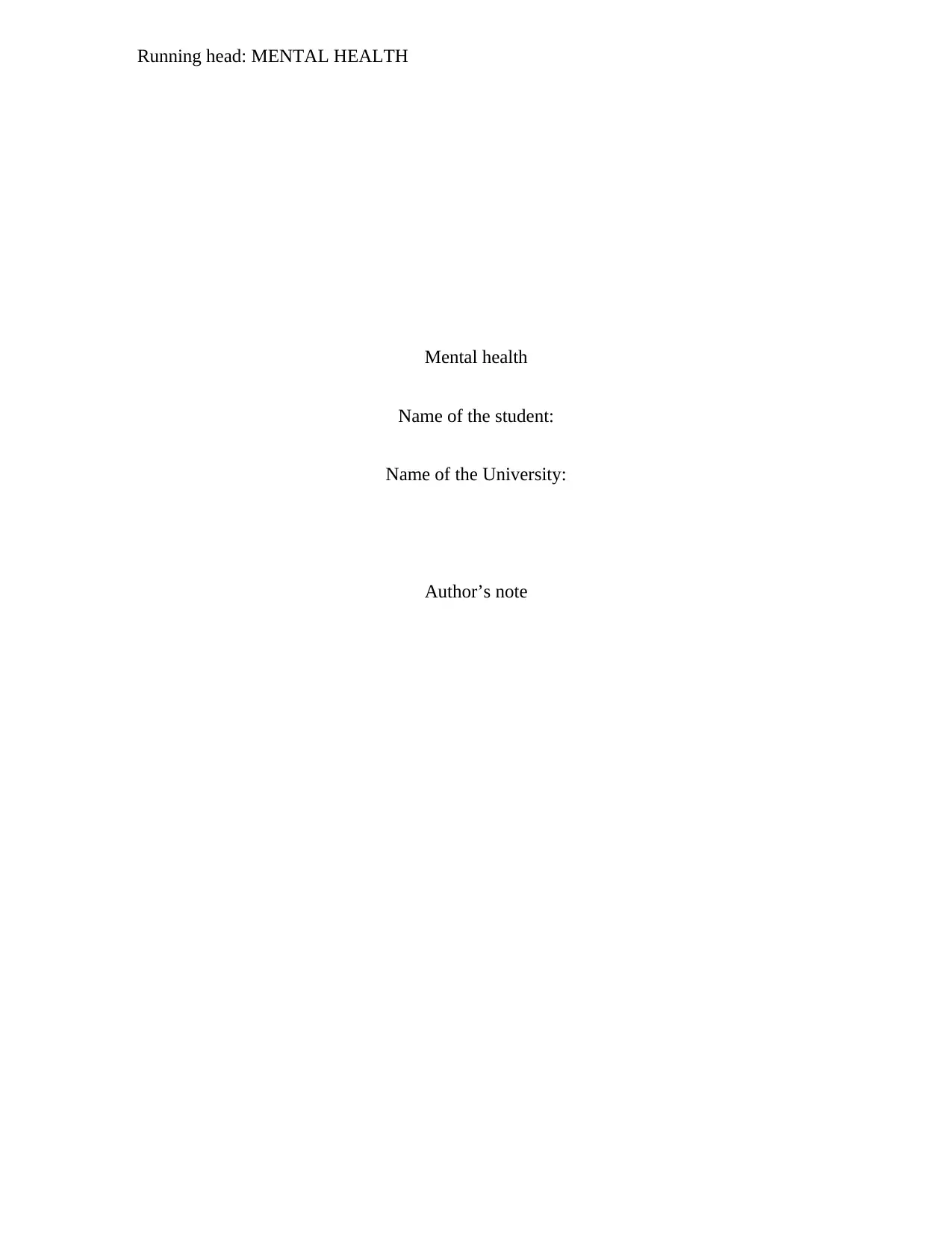
Running head: MENTAL HEALTH
Mental health
Name of the student:
Name of the University:
Author’s note
Mental health
Name of the student:
Name of the University:
Author’s note
Paraphrase This Document
Need a fresh take? Get an instant paraphrase of this document with our AI Paraphraser
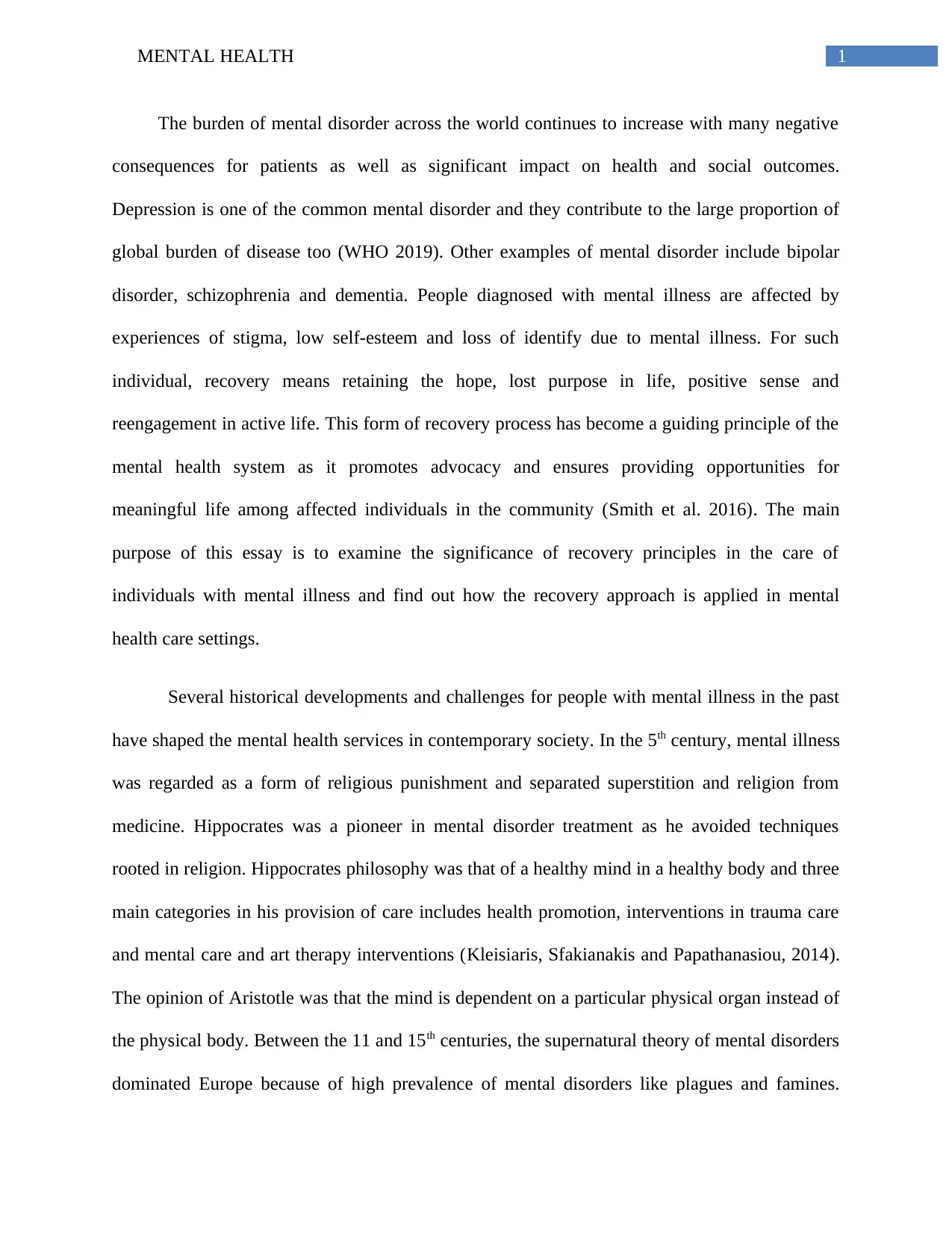
1MENTAL HEALTH
The burden of mental disorder across the world continues to increase with many negative
consequences for patients as well as significant impact on health and social outcomes.
Depression is one of the common mental disorder and they contribute to the large proportion of
global burden of disease too (WHO 2019). Other examples of mental disorder include bipolar
disorder, schizophrenia and dementia. People diagnosed with mental illness are affected by
experiences of stigma, low self-esteem and loss of identify due to mental illness. For such
individual, recovery means retaining the hope, lost purpose in life, positive sense and
reengagement in active life. This form of recovery process has become a guiding principle of the
mental health system as it promotes advocacy and ensures providing opportunities for
meaningful life among affected individuals in the community (Smith et al. 2016). The main
purpose of this essay is to examine the significance of recovery principles in the care of
individuals with mental illness and find out how the recovery approach is applied in mental
health care settings.
Several historical developments and challenges for people with mental illness in the past
have shaped the mental health services in contemporary society. In the 5th century, mental illness
was regarded as a form of religious punishment and separated superstition and religion from
medicine. Hippocrates was a pioneer in mental disorder treatment as he avoided techniques
rooted in religion. Hippocrates philosophy was that of a healthy mind in a healthy body and three
main categories in his provision of care includes health promotion, interventions in trauma care
and mental care and art therapy interventions (Kleisiaris, Sfakianakis and Papathanasiou, 2014).
The opinion of Aristotle was that the mind is dependent on a particular physical organ instead of
the physical body. Between the 11 and 15th centuries, the supernatural theory of mental disorders
dominated Europe because of high prevalence of mental disorders like plagues and famines.
The burden of mental disorder across the world continues to increase with many negative
consequences for patients as well as significant impact on health and social outcomes.
Depression is one of the common mental disorder and they contribute to the large proportion of
global burden of disease too (WHO 2019). Other examples of mental disorder include bipolar
disorder, schizophrenia and dementia. People diagnosed with mental illness are affected by
experiences of stigma, low self-esteem and loss of identify due to mental illness. For such
individual, recovery means retaining the hope, lost purpose in life, positive sense and
reengagement in active life. This form of recovery process has become a guiding principle of the
mental health system as it promotes advocacy and ensures providing opportunities for
meaningful life among affected individuals in the community (Smith et al. 2016). The main
purpose of this essay is to examine the significance of recovery principles in the care of
individuals with mental illness and find out how the recovery approach is applied in mental
health care settings.
Several historical developments and challenges for people with mental illness in the past
have shaped the mental health services in contemporary society. In the 5th century, mental illness
was regarded as a form of religious punishment and separated superstition and religion from
medicine. Hippocrates was a pioneer in mental disorder treatment as he avoided techniques
rooted in religion. Hippocrates philosophy was that of a healthy mind in a healthy body and three
main categories in his provision of care includes health promotion, interventions in trauma care
and mental care and art therapy interventions (Kleisiaris, Sfakianakis and Papathanasiou, 2014).
The opinion of Aristotle was that the mind is dependent on a particular physical organ instead of
the physical body. Between the 11 and 15th centuries, the supernatural theory of mental disorders
dominated Europe because of high prevalence of mental disorders like plagues and famines.
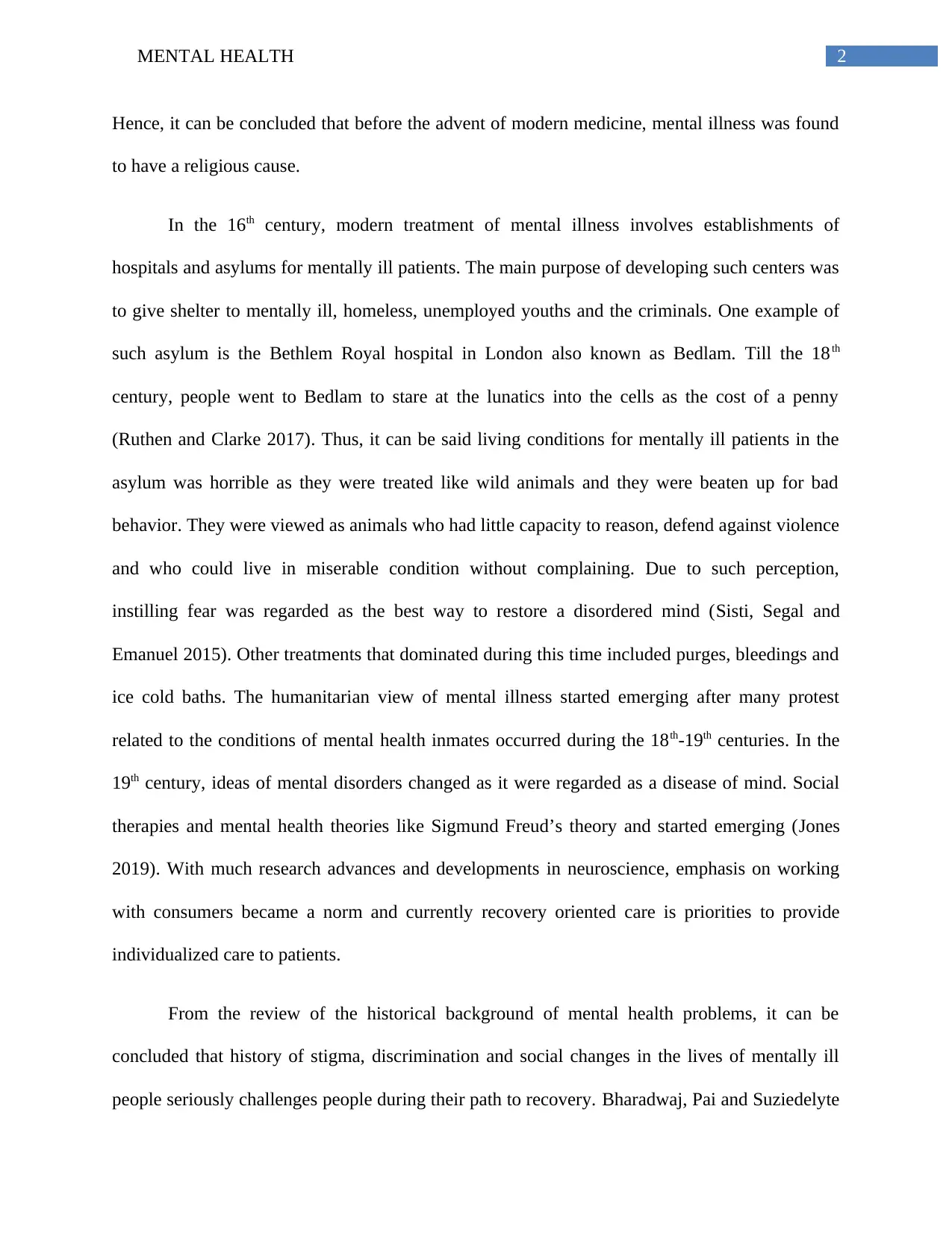
2MENTAL HEALTH
Hence, it can be concluded that before the advent of modern medicine, mental illness was found
to have a religious cause.
In the 16th century, modern treatment of mental illness involves establishments of
hospitals and asylums for mentally ill patients. The main purpose of developing such centers was
to give shelter to mentally ill, homeless, unemployed youths and the criminals. One example of
such asylum is the Bethlem Royal hospital in London also known as Bedlam. Till the 18th
century, people went to Bedlam to stare at the lunatics into the cells as the cost of a penny
(Ruthen and Clarke 2017). Thus, it can be said living conditions for mentally ill patients in the
asylum was horrible as they were treated like wild animals and they were beaten up for bad
behavior. They were viewed as animals who had little capacity to reason, defend against violence
and who could live in miserable condition without complaining. Due to such perception,
instilling fear was regarded as the best way to restore a disordered mind (Sisti, Segal and
Emanuel 2015). Other treatments that dominated during this time included purges, bleedings and
ice cold baths. The humanitarian view of mental illness started emerging after many protest
related to the conditions of mental health inmates occurred during the 18th-19th centuries. In the
19th century, ideas of mental disorders changed as it were regarded as a disease of mind. Social
therapies and mental health theories like Sigmund Freud’s theory and started emerging (Jones
2019). With much research advances and developments in neuroscience, emphasis on working
with consumers became a norm and currently recovery oriented care is priorities to provide
individualized care to patients.
From the review of the historical background of mental health problems, it can be
concluded that history of stigma, discrimination and social changes in the lives of mentally ill
people seriously challenges people during their path to recovery. Bharadwaj, Pai and Suziedelyte
Hence, it can be concluded that before the advent of modern medicine, mental illness was found
to have a religious cause.
In the 16th century, modern treatment of mental illness involves establishments of
hospitals and asylums for mentally ill patients. The main purpose of developing such centers was
to give shelter to mentally ill, homeless, unemployed youths and the criminals. One example of
such asylum is the Bethlem Royal hospital in London also known as Bedlam. Till the 18th
century, people went to Bedlam to stare at the lunatics into the cells as the cost of a penny
(Ruthen and Clarke 2017). Thus, it can be said living conditions for mentally ill patients in the
asylum was horrible as they were treated like wild animals and they were beaten up for bad
behavior. They were viewed as animals who had little capacity to reason, defend against violence
and who could live in miserable condition without complaining. Due to such perception,
instilling fear was regarded as the best way to restore a disordered mind (Sisti, Segal and
Emanuel 2015). Other treatments that dominated during this time included purges, bleedings and
ice cold baths. The humanitarian view of mental illness started emerging after many protest
related to the conditions of mental health inmates occurred during the 18th-19th centuries. In the
19th century, ideas of mental disorders changed as it were regarded as a disease of mind. Social
therapies and mental health theories like Sigmund Freud’s theory and started emerging (Jones
2019). With much research advances and developments in neuroscience, emphasis on working
with consumers became a norm and currently recovery oriented care is priorities to provide
individualized care to patients.
From the review of the historical background of mental health problems, it can be
concluded that history of stigma, discrimination and social changes in the lives of mentally ill
people seriously challenges people during their path to recovery. Bharadwaj, Pai and Suziedelyte
⊘ This is a preview!⊘
Do you want full access?
Subscribe today to unlock all pages.

Trusted by 1+ million students worldwide
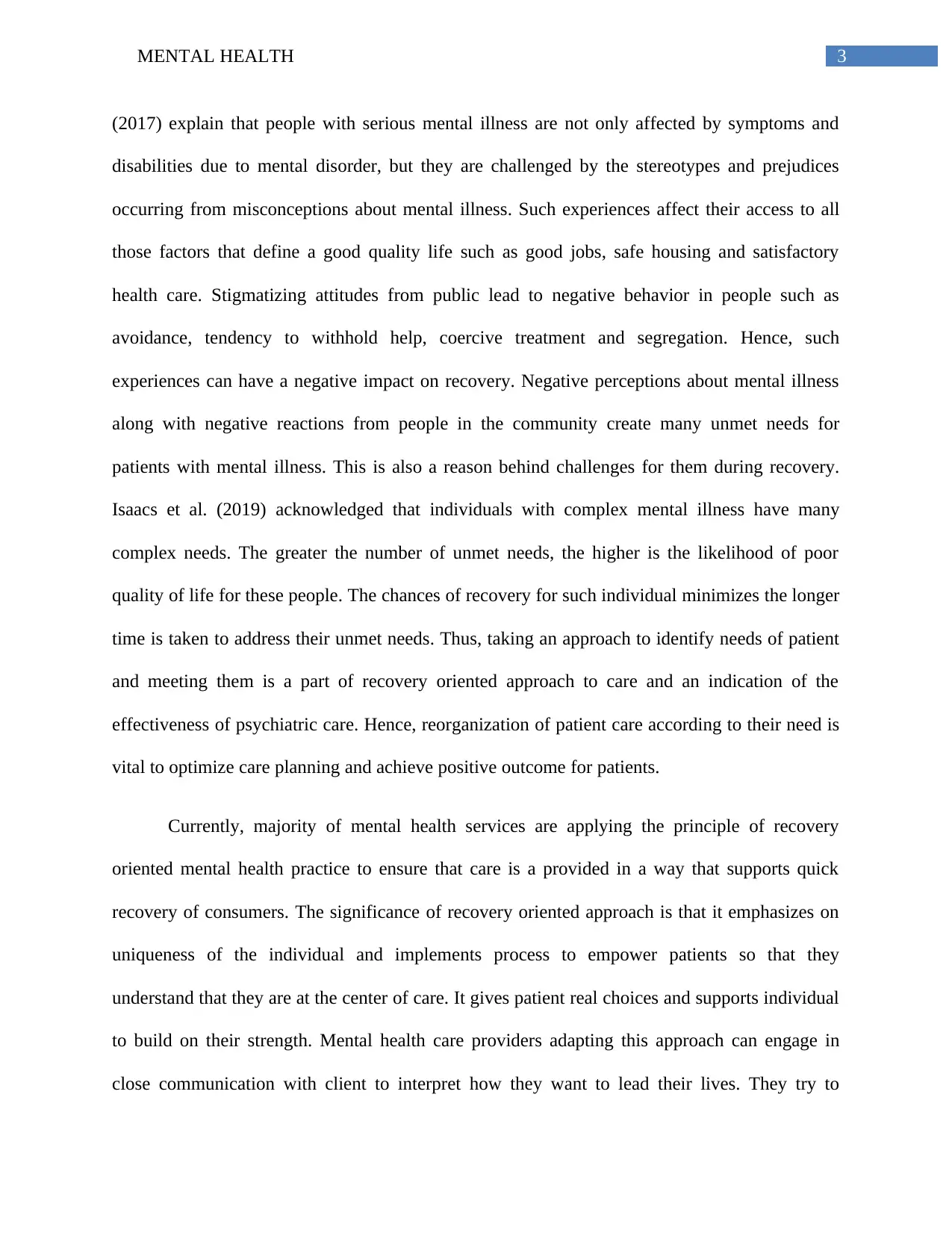
3MENTAL HEALTH
(2017) explain that people with serious mental illness are not only affected by symptoms and
disabilities due to mental disorder, but they are challenged by the stereotypes and prejudices
occurring from misconceptions about mental illness. Such experiences affect their access to all
those factors that define a good quality life such as good jobs, safe housing and satisfactory
health care. Stigmatizing attitudes from public lead to negative behavior in people such as
avoidance, tendency to withhold help, coercive treatment and segregation. Hence, such
experiences can have a negative impact on recovery. Negative perceptions about mental illness
along with negative reactions from people in the community create many unmet needs for
patients with mental illness. This is also a reason behind challenges for them during recovery.
Isaacs et al. (2019) acknowledged that individuals with complex mental illness have many
complex needs. The greater the number of unmet needs, the higher is the likelihood of poor
quality of life for these people. The chances of recovery for such individual minimizes the longer
time is taken to address their unmet needs. Thus, taking an approach to identify needs of patient
and meeting them is a part of recovery oriented approach to care and an indication of the
effectiveness of psychiatric care. Hence, reorganization of patient care according to their need is
vital to optimize care planning and achieve positive outcome for patients.
Currently, majority of mental health services are applying the principle of recovery
oriented mental health practice to ensure that care is a provided in a way that supports quick
recovery of consumers. The significance of recovery oriented approach is that it emphasizes on
uniqueness of the individual and implements process to empower patients so that they
understand that they are at the center of care. It gives patient real choices and supports individual
to build on their strength. Mental health care providers adapting this approach can engage in
close communication with client to interpret how they want to lead their lives. They try to
(2017) explain that people with serious mental illness are not only affected by symptoms and
disabilities due to mental disorder, but they are challenged by the stereotypes and prejudices
occurring from misconceptions about mental illness. Such experiences affect their access to all
those factors that define a good quality life such as good jobs, safe housing and satisfactory
health care. Stigmatizing attitudes from public lead to negative behavior in people such as
avoidance, tendency to withhold help, coercive treatment and segregation. Hence, such
experiences can have a negative impact on recovery. Negative perceptions about mental illness
along with negative reactions from people in the community create many unmet needs for
patients with mental illness. This is also a reason behind challenges for them during recovery.
Isaacs et al. (2019) acknowledged that individuals with complex mental illness have many
complex needs. The greater the number of unmet needs, the higher is the likelihood of poor
quality of life for these people. The chances of recovery for such individual minimizes the longer
time is taken to address their unmet needs. Thus, taking an approach to identify needs of patient
and meeting them is a part of recovery oriented approach to care and an indication of the
effectiveness of psychiatric care. Hence, reorganization of patient care according to their need is
vital to optimize care planning and achieve positive outcome for patients.
Currently, majority of mental health services are applying the principle of recovery
oriented mental health practice to ensure that care is a provided in a way that supports quick
recovery of consumers. The significance of recovery oriented approach is that it emphasizes on
uniqueness of the individual and implements process to empower patients so that they
understand that they are at the center of care. It gives patient real choices and supports individual
to build on their strength. Mental health care providers adapting this approach can engage in
close communication with client to interpret how they want to lead their lives. They try to
Paraphrase This Document
Need a fresh take? Get an instant paraphrase of this document with our AI Paraphraser
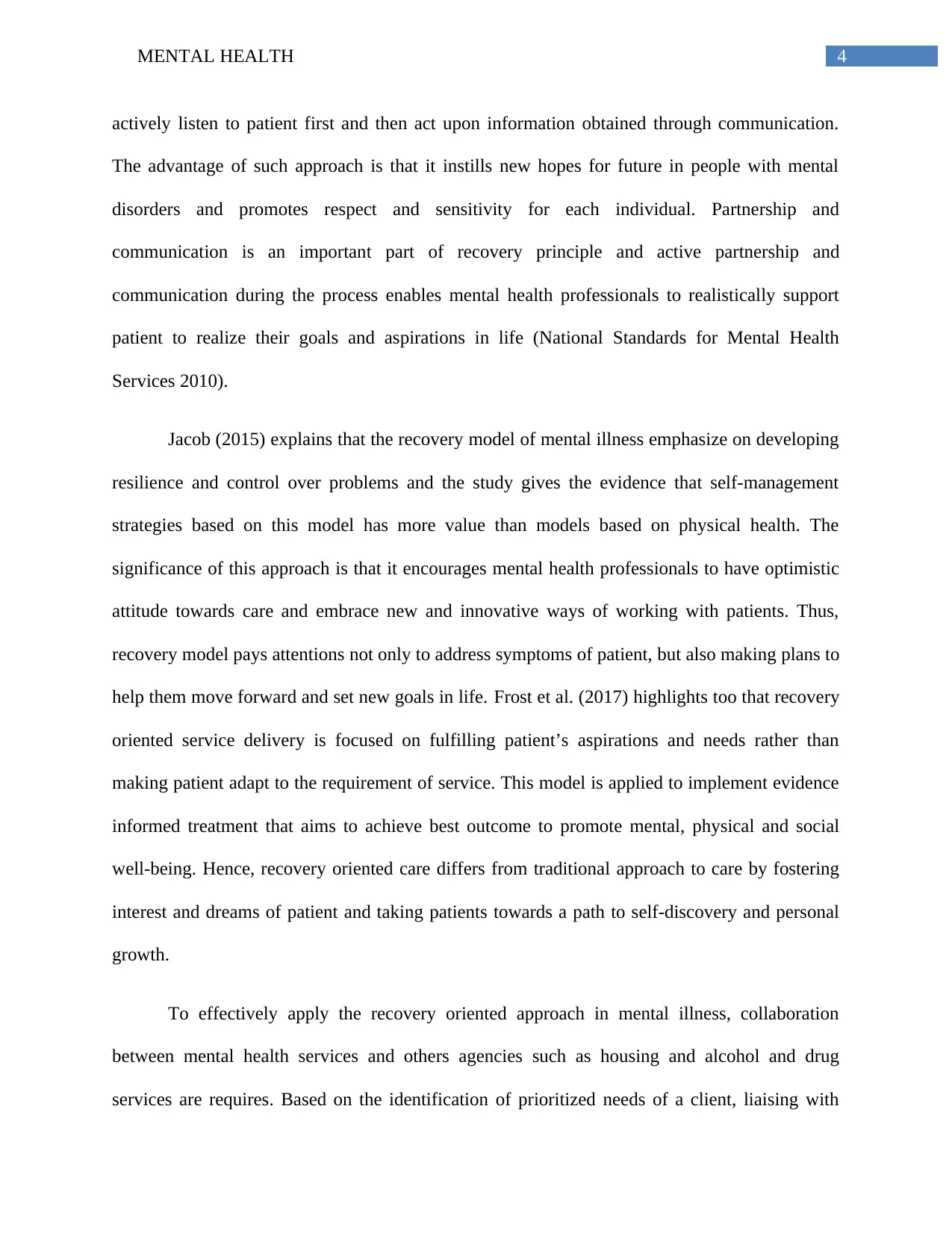
4MENTAL HEALTH
actively listen to patient first and then act upon information obtained through communication.
The advantage of such approach is that it instills new hopes for future in people with mental
disorders and promotes respect and sensitivity for each individual. Partnership and
communication is an important part of recovery principle and active partnership and
communication during the process enables mental health professionals to realistically support
patient to realize their goals and aspirations in life (National Standards for Mental Health
Services 2010).
Jacob (2015) explains that the recovery model of mental illness emphasize on developing
resilience and control over problems and the study gives the evidence that self-management
strategies based on this model has more value than models based on physical health. The
significance of this approach is that it encourages mental health professionals to have optimistic
attitude towards care and embrace new and innovative ways of working with patients. Thus,
recovery model pays attentions not only to address symptoms of patient, but also making plans to
help them move forward and set new goals in life. Frost et al. (2017) highlights too that recovery
oriented service delivery is focused on fulfilling patient’s aspirations and needs rather than
making patient adapt to the requirement of service. This model is applied to implement evidence
informed treatment that aims to achieve best outcome to promote mental, physical and social
well-being. Hence, recovery oriented care differs from traditional approach to care by fostering
interest and dreams of patient and taking patients towards a path to self-discovery and personal
growth.
To effectively apply the recovery oriented approach in mental illness, collaboration
between mental health services and others agencies such as housing and alcohol and drug
services are requires. Based on the identification of prioritized needs of a client, liaising with
actively listen to patient first and then act upon information obtained through communication.
The advantage of such approach is that it instills new hopes for future in people with mental
disorders and promotes respect and sensitivity for each individual. Partnership and
communication is an important part of recovery principle and active partnership and
communication during the process enables mental health professionals to realistically support
patient to realize their goals and aspirations in life (National Standards for Mental Health
Services 2010).
Jacob (2015) explains that the recovery model of mental illness emphasize on developing
resilience and control over problems and the study gives the evidence that self-management
strategies based on this model has more value than models based on physical health. The
significance of this approach is that it encourages mental health professionals to have optimistic
attitude towards care and embrace new and innovative ways of working with patients. Thus,
recovery model pays attentions not only to address symptoms of patient, but also making plans to
help them move forward and set new goals in life. Frost et al. (2017) highlights too that recovery
oriented service delivery is focused on fulfilling patient’s aspirations and needs rather than
making patient adapt to the requirement of service. This model is applied to implement evidence
informed treatment that aims to achieve best outcome to promote mental, physical and social
well-being. Hence, recovery oriented care differs from traditional approach to care by fostering
interest and dreams of patient and taking patients towards a path to self-discovery and personal
growth.
To effectively apply the recovery oriented approach in mental illness, collaboration
between mental health services and others agencies such as housing and alcohol and drug
services are requires. Based on the identification of prioritized needs of a client, liaising with
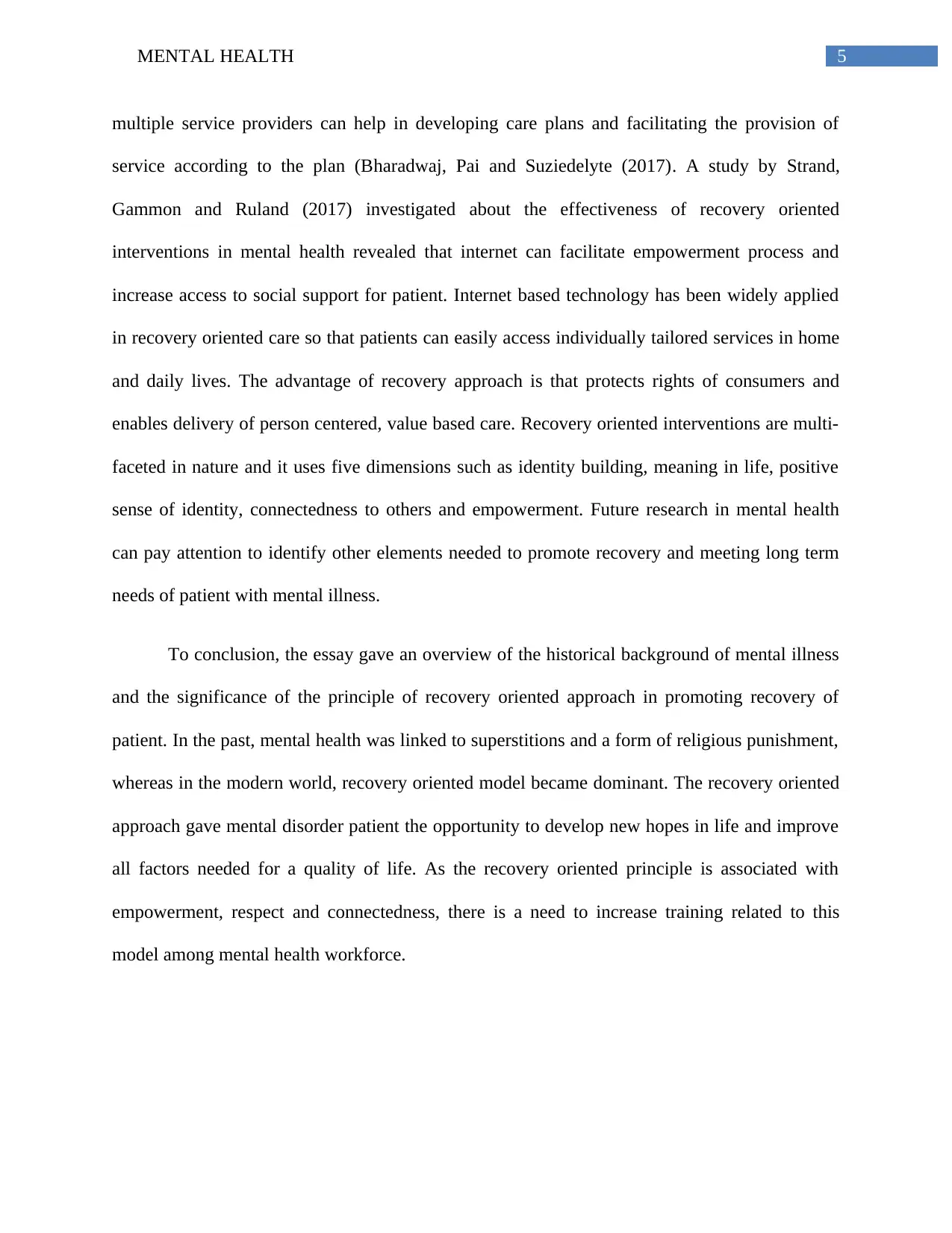
5MENTAL HEALTH
multiple service providers can help in developing care plans and facilitating the provision of
service according to the plan (Bharadwaj, Pai and Suziedelyte (2017). A study by Strand,
Gammon and Ruland (2017) investigated about the effectiveness of recovery oriented
interventions in mental health revealed that internet can facilitate empowerment process and
increase access to social support for patient. Internet based technology has been widely applied
in recovery oriented care so that patients can easily access individually tailored services in home
and daily lives. The advantage of recovery approach is that protects rights of consumers and
enables delivery of person centered, value based care. Recovery oriented interventions are multi-
faceted in nature and it uses five dimensions such as identity building, meaning in life, positive
sense of identity, connectedness to others and empowerment. Future research in mental health
can pay attention to identify other elements needed to promote recovery and meeting long term
needs of patient with mental illness.
To conclusion, the essay gave an overview of the historical background of mental illness
and the significance of the principle of recovery oriented approach in promoting recovery of
patient. In the past, mental health was linked to superstitions and a form of religious punishment,
whereas in the modern world, recovery oriented model became dominant. The recovery oriented
approach gave mental disorder patient the opportunity to develop new hopes in life and improve
all factors needed for a quality of life. As the recovery oriented principle is associated with
empowerment, respect and connectedness, there is a need to increase training related to this
model among mental health workforce.
multiple service providers can help in developing care plans and facilitating the provision of
service according to the plan (Bharadwaj, Pai and Suziedelyte (2017). A study by Strand,
Gammon and Ruland (2017) investigated about the effectiveness of recovery oriented
interventions in mental health revealed that internet can facilitate empowerment process and
increase access to social support for patient. Internet based technology has been widely applied
in recovery oriented care so that patients can easily access individually tailored services in home
and daily lives. The advantage of recovery approach is that protects rights of consumers and
enables delivery of person centered, value based care. Recovery oriented interventions are multi-
faceted in nature and it uses five dimensions such as identity building, meaning in life, positive
sense of identity, connectedness to others and empowerment. Future research in mental health
can pay attention to identify other elements needed to promote recovery and meeting long term
needs of patient with mental illness.
To conclusion, the essay gave an overview of the historical background of mental illness
and the significance of the principle of recovery oriented approach in promoting recovery of
patient. In the past, mental health was linked to superstitions and a form of religious punishment,
whereas in the modern world, recovery oriented model became dominant. The recovery oriented
approach gave mental disorder patient the opportunity to develop new hopes in life and improve
all factors needed for a quality of life. As the recovery oriented principle is associated with
empowerment, respect and connectedness, there is a need to increase training related to this
model among mental health workforce.
⊘ This is a preview!⊘
Do you want full access?
Subscribe today to unlock all pages.

Trusted by 1+ million students worldwide
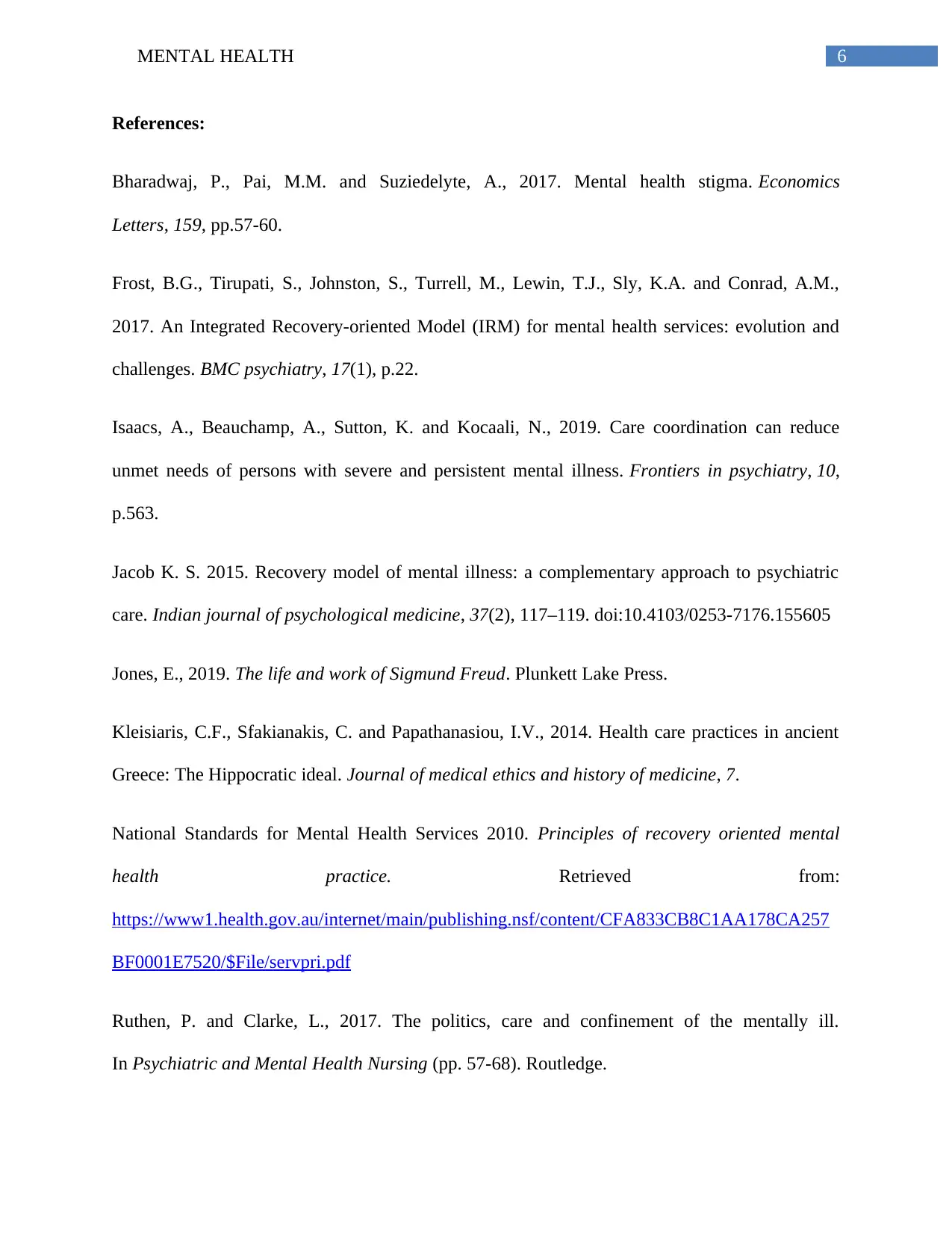
6MENTAL HEALTH
References:
Bharadwaj, P., Pai, M.M. and Suziedelyte, A., 2017. Mental health stigma. Economics
Letters, 159, pp.57-60.
Frost, B.G., Tirupati, S., Johnston, S., Turrell, M., Lewin, T.J., Sly, K.A. and Conrad, A.M.,
2017. An Integrated Recovery-oriented Model (IRM) for mental health services: evolution and
challenges. BMC psychiatry, 17(1), p.22.
Isaacs, A., Beauchamp, A., Sutton, K. and Kocaali, N., 2019. Care coordination can reduce
unmet needs of persons with severe and persistent mental illness. Frontiers in psychiatry, 10,
p.563.
Jacob K. S. 2015. Recovery model of mental illness: a complementary approach to psychiatric
care. Indian journal of psychological medicine, 37(2), 117–119. doi:10.4103/0253-7176.155605
Jones, E., 2019. The life and work of Sigmund Freud. Plunkett Lake Press.
Kleisiaris, C.F., Sfakianakis, C. and Papathanasiou, I.V., 2014. Health care practices in ancient
Greece: The Hippocratic ideal. Journal of medical ethics and history of medicine, 7.
National Standards for Mental Health Services 2010. Principles of recovery oriented mental
health practice. Retrieved from:
https://www1.health.gov.au/internet/main/publishing.nsf/content/CFA833CB8C1AA178CA257
BF0001E7520/$File/servpri.pdf
Ruthen, P. and Clarke, L., 2017. The politics, care and confinement of the mentally ill.
In Psychiatric and Mental Health Nursing (pp. 57-68). Routledge.
References:
Bharadwaj, P., Pai, M.M. and Suziedelyte, A., 2017. Mental health stigma. Economics
Letters, 159, pp.57-60.
Frost, B.G., Tirupati, S., Johnston, S., Turrell, M., Lewin, T.J., Sly, K.A. and Conrad, A.M.,
2017. An Integrated Recovery-oriented Model (IRM) for mental health services: evolution and
challenges. BMC psychiatry, 17(1), p.22.
Isaacs, A., Beauchamp, A., Sutton, K. and Kocaali, N., 2019. Care coordination can reduce
unmet needs of persons with severe and persistent mental illness. Frontiers in psychiatry, 10,
p.563.
Jacob K. S. 2015. Recovery model of mental illness: a complementary approach to psychiatric
care. Indian journal of psychological medicine, 37(2), 117–119. doi:10.4103/0253-7176.155605
Jones, E., 2019. The life and work of Sigmund Freud. Plunkett Lake Press.
Kleisiaris, C.F., Sfakianakis, C. and Papathanasiou, I.V., 2014. Health care practices in ancient
Greece: The Hippocratic ideal. Journal of medical ethics and history of medicine, 7.
National Standards for Mental Health Services 2010. Principles of recovery oriented mental
health practice. Retrieved from:
https://www1.health.gov.au/internet/main/publishing.nsf/content/CFA833CB8C1AA178CA257
BF0001E7520/$File/servpri.pdf
Ruthen, P. and Clarke, L., 2017. The politics, care and confinement of the mentally ill.
In Psychiatric and Mental Health Nursing (pp. 57-68). Routledge.
Paraphrase This Document
Need a fresh take? Get an instant paraphrase of this document with our AI Paraphraser
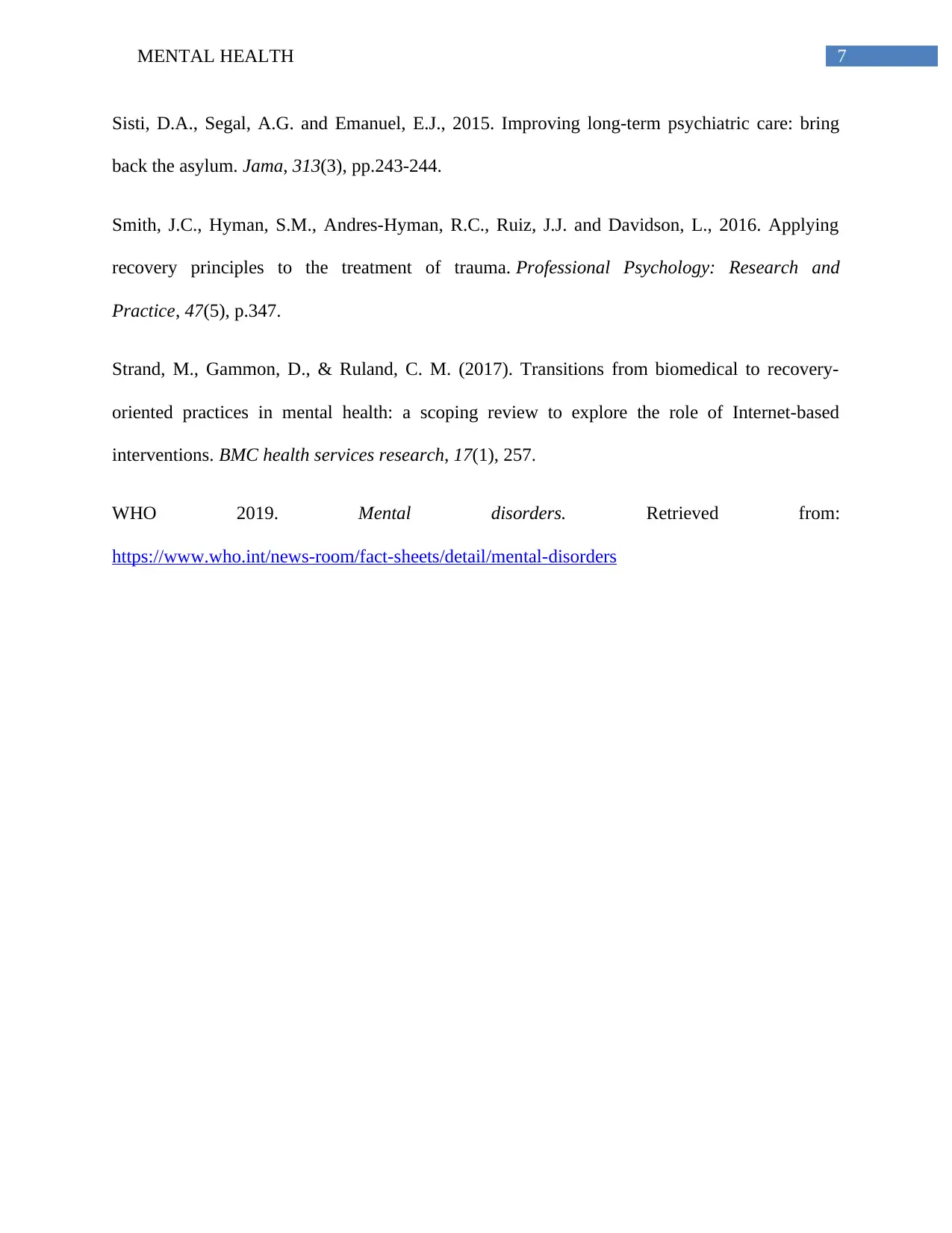
7MENTAL HEALTH
Sisti, D.A., Segal, A.G. and Emanuel, E.J., 2015. Improving long-term psychiatric care: bring
back the asylum. Jama, 313(3), pp.243-244.
Smith, J.C., Hyman, S.M., Andres-Hyman, R.C., Ruiz, J.J. and Davidson, L., 2016. Applying
recovery principles to the treatment of trauma. Professional Psychology: Research and
Practice, 47(5), p.347.
Strand, M., Gammon, D., & Ruland, C. M. (2017). Transitions from biomedical to recovery-
oriented practices in mental health: a scoping review to explore the role of Internet-based
interventions. BMC health services research, 17(1), 257.
WHO 2019. Mental disorders. Retrieved from:
https://www.who.int/news-room/fact-sheets/detail/mental-disorders
Sisti, D.A., Segal, A.G. and Emanuel, E.J., 2015. Improving long-term psychiatric care: bring
back the asylum. Jama, 313(3), pp.243-244.
Smith, J.C., Hyman, S.M., Andres-Hyman, R.C., Ruiz, J.J. and Davidson, L., 2016. Applying
recovery principles to the treatment of trauma. Professional Psychology: Research and
Practice, 47(5), p.347.
Strand, M., Gammon, D., & Ruland, C. M. (2017). Transitions from biomedical to recovery-
oriented practices in mental health: a scoping review to explore the role of Internet-based
interventions. BMC health services research, 17(1), 257.
WHO 2019. Mental disorders. Retrieved from:
https://www.who.int/news-room/fact-sheets/detail/mental-disorders
1 out of 8
Related Documents
Your All-in-One AI-Powered Toolkit for Academic Success.
+13062052269
info@desklib.com
Available 24*7 on WhatsApp / Email
![[object Object]](/_next/static/media/star-bottom.7253800d.svg)
Unlock your academic potential
Copyright © 2020–2026 A2Z Services. All Rights Reserved. Developed and managed by ZUCOL.





